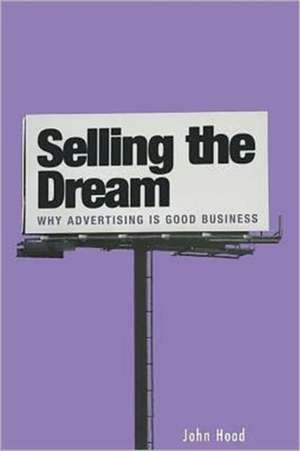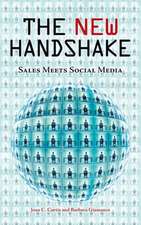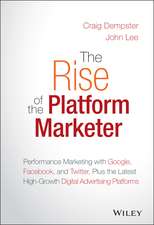Selling the Dream: Why Advertising Is Good Business
Autor John M. Hooden Limba Engleză Paperback – 29 oct 2005 – vârsta până la 17 ani
| Toate formatele și edițiile | Preț | Express |
|---|---|---|
| Paperback (1) | 179.25 lei 6-8 săpt. | |
| Bloomsbury Publishing – 29 oct 2005 | 179.25 lei 6-8 săpt. | |
| Hardback (1) | 438.41 lei 6-8 săpt. | |
| Bloomsbury Publishing – 29 oct 2005 | 438.41 lei 6-8 săpt. |
Preț: 179.25 lei
Preț vechi: 232.77 lei
-23% Nou
Puncte Express: 269
Preț estimativ în valută:
34.30€ • 35.91$ • 28.38£
34.30€ • 35.91$ • 28.38£
Carte tipărită la comandă
Livrare economică 05-19 aprilie
Preluare comenzi: 021 569.72.76
Specificații
ISBN-13: 9780313361876
ISBN-10: 0313361878
Pagini: 272
Dimensiuni: 156 x 235 x 14 mm
Greutate: 0.37 kg
Editura: Bloomsbury Publishing
Colecția Praeger
Locul publicării:New York, United States
ISBN-10: 0313361878
Pagini: 272
Dimensiuni: 156 x 235 x 14 mm
Greutate: 0.37 kg
Editura: Bloomsbury Publishing
Colecția Praeger
Locul publicării:New York, United States
Notă biografică
John Hood is President of the John Locke Foundation, a public policy think tank based in Raleigh, North Carolina, where he also serves as publisher of the foundation's monthly newspaper, the Carolina Journal. A professional writer whose articles have appeared in such publications as The New Republic, National Review, Reason, The Wall Street Journal, and the New York Times, he is the author of Investor Politics and The Heroic Enterprise.
Cuprins
PrefaceIntroductionThe Birth of Advertising and Commercial CultureA Carnival of Conspicuous ConsumptionBroadcasting Revolution, Advertising EvolutionThe New Economics and Science of AdvertisingLiving the Commercial LifeHealth Claims and the Problem of FraudAdvertising and the Consuming ChildThe Economics and Ethics of Selling SinConclusionNotesIndex
Recenzii
Hood provides a fascinating look into the world of advertising and beyond to support his view that advertising provides a societal good: it promotes freedom of choice, competition, and innovation. As written by Hood, the evolution of advertising is quite an interesting journey. Although advertising is generally regarded as a modern phenomenon, the author traces the growth of promotion and commerce back to cobblers in Babylonia who hung shoes on their shop doors 5,000 years ago. Merchants of ancient Rome used such advertising techniques as pictures, brand names, and slogans to differentiate their wares. Each century has added its own stamp to the art of advertising, with town criers, handbills, newspapers, radio, and television all providing new ways to reach successive generations of consumers. Hood notes that no less an advertiser than Benjamin Franklin used advertising to differentiate his famous stove from others that would damage the eyes . and shrivel the skin. He examines a wide range of advertising topics, including conspicuous consumption, product health claims, and economic and societal factors. Highly recommended. Upper-division undergraduate and graduate marketing students, faculty, researchers, and practitioners, as well as anyone interested in advertising.
Consultant and journalist Hood reacts to how Americans feel in general about advertising by reminding them that marketing fulfills desires and demand while increasing profits and often making or breaking whole businesses and industries. Along with very well-chosen (and very funny) examples of how Americans feel and deal with advertising as represented in popular culture. Hood is brutally honest about why some may perceive advertising as a trail of lies, showing that in fact the industry is held to a rather strict set of standards and tends to react to that same consumer desire and demand that helps to define it.
Consultant and journalist Hood reacts to how Americans feel in general about advertising by reminding them that marketing fulfills desires and demand while increasing profits and often making or breaking whole businesses and industries. Along with very well-chosen (and very funny) examples of how Americans feel and deal with advertising as represented in popular culture. Hood is brutally honest about why some may perceive advertising as a trail of lies, showing that in fact the industry is held to a rather strict set of standards and tends to react to that same consumer desire and demand that helps to define it.















